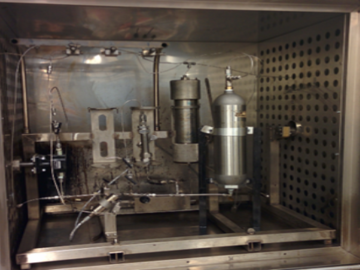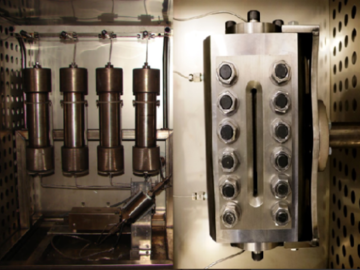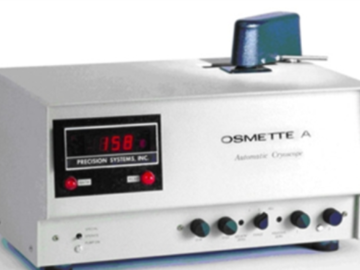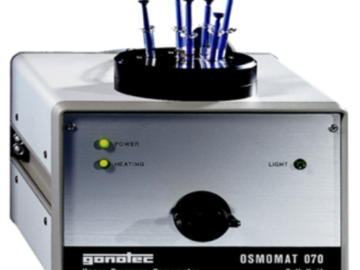Lab facilities
We design and fabricate the state-of-art experimental apparatus for our research and use an array of advanced and precise tools.
LABORATORY CAPABILITIES
Phase behavior and thermophysical property measurements at high pressures and high temperatures
Bitumen/water and multi-components solvent phase behavior studies,
Multicomponent phase equilibrium studies of petroleum and non-petroleum fluids,
Dead-oil and live-oil viscosity and density measurements,
Detailed heavy oil and bitumen characterization, simulated distillation, GPC, MW, TAN measurements,
Asphaltene precipitation studies
Laboratory scale evaluation of solvent-aided thermal recovery processes
Solvent screening
1D, 2D, and 3D sand pack flooding experiments
Solvent detection and recovery experiments
Asphaltene precipitation in porous media
Reservoir simulation and PVT models
Multi-component solvent/bitumen reservoir simulation and fluid models
CO2/water and CO2/bitumen reservoir simulation and fluid models
Aquathermolysis and reactive reservoir simulation and fluid models
Acid-gas geological storage reservoir simulation and fluid models
Diffusion and dispersion measurements
Molecular diffusion of gaseous solvents in liquids
Binary mutual molecular diffusion in liquids
Gas ex-solution and diffusion kinetics studies
Molecular diffusion in porous media
Dispersion in porous media
Rheological property measurements
Interfacial tension measurements
___________________________________________________________________
HPHT PVT Setups
Our laboratory is equipped with several PVT set-ups to conduct the detailed phase behaviour experimental studies including:
Vapour-Liquid Equilibrium Systems
Liquid-Liquid Equilibrium Systems
Bubble/Dew Point Detection
Conventional PVT tests (CCE, DL, CVD, and Separator Test)
Density and Viscosity Measurements
Non-Equilibrium Gas Dissolution and Ex-solution Tests
The PVT cells are designed for application temperatures up to 250 ºC and pressures up to 10 MPa. The PVT set-ups are used to generate the required PVT data for reservoir simulation of solvent-aided thermal recovery processes, design and study of many chemical and petroleum engineering processes such as steam-assisted-gravity-drainage (SAGD), solvent-aided thermal recovery processes such as expanded-solvent steam assisted gravity drainage (ES-SAGD), hot solvent injection such as N-solv, production and enhanced oil recovery processes of conventional oil reservoirs, oil refining and upgrading, gas processing and petrochemical processes.

HPHT Asphaltene Detection Apparatus
To detect the onset of asphaltene, wax or heavy phase formation a HTHP microscope is used in our lab. This equipment generates valuable experimental data applicable to enhanced oil recovery and solvent based and solvent aided thermal recovery processes.
- Temperatures up to 200 ºC and pressures up to 10 MPa
- Low viscosity to extra heavy oils and bitumen
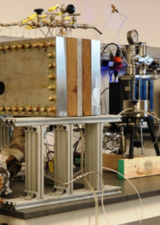
2D/3D Sand-Pack ES-SAGD Physical Models
To evaluate the performance of solvent-aided thermal recovery processes, we use a 2D sand-pack model in our laboratory. Different steam/solvent injection scenarios can be studied using the sand-pack physical model.
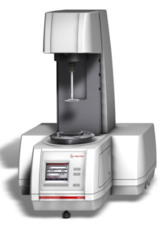
Rheological Properties Measurements
An MCR-302 Anton-Paar Rheometer is used to conduct the rheological property measurements of different samples at temperatures up to 300 ºC and pressures up to 15 MPa.
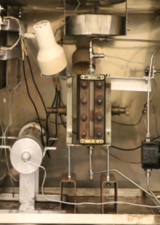
HPHT Gas/Liquid Molecular Diffusion Coefficient Measurements
Molecular diffusion coefficient of gases in liquid phase is a necessary parameter in design of many recovery processes as well as chemical engineering processes. In our laboratory, we measure the diffusion coefficient of gases in liquid phase using a modified pressure-decay method.
- Temperatures up to 200 ºC
- Low viscosity to extra heavy oils and bitumen
- Concentration dependent diffusion coefficient
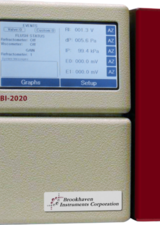
Liquid/Liquid Molecular Diffusion Coefficient Measurements
We use a Taylor dispersion setup to measure the molecular diffusion coefficient of liquid-liquid systems at operating temperatures up to 80 ºC.
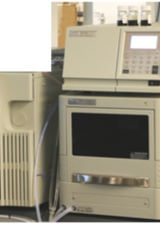
Compositional and Analytical Analysis
This apparatus is used for
- Gas phase hydration
- Liquid hydrocarbon analysis ASTM D2887 and D7169
- Sulfur content analysis of gas and liquid samples
- Saturate, Aromatic, Resin, and Asphaltene (SARA) analysis
- Karl-Fischer titration for water content analysis


